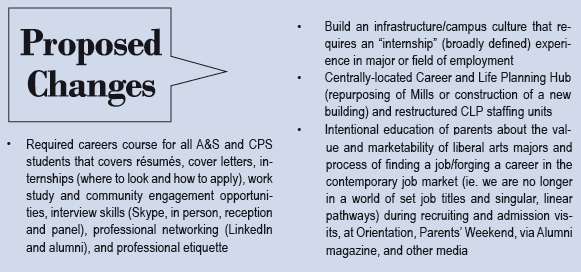Career and Life Planning Committee suggests a required course for A&S and CPS students to cover resumes, internships, networking, and professional etiquette.
You did it. You got into college. After countless hours spent taking the SAT/ACT, writing and revising drafts of entrance essays, and filling out applications, you received your acceptance letter and are officially an undergrad. The only question left is, “Now what?” While the college application process is stressful and time-consuming, it is a pretty straightforward plan for the next four years of your life. What is terrifying is everything beyond that.
If you’re like me, you have trouble falling asleep at night because you simply don’t have the answers to the questions concerning where your future is headed constantly running through your head. What can I do with my major? How competitive will I be in the job market? How do I develop my own personal brand? Should I apply to graduate school, or get a job first? What would I even go to graduate school for? These, and countless other questions, might as well follow me around campus on a big Jumbotron flashing across the screen in obnoxious neon letters.
Over the past few months, a 16-person Career and Life Planning (CLP) committee has been working to develop ideas for possible future programs that will serve as a catalyst for an innovative model of career and life planning on campus. With the faculty’s consensus that “pervasive career planning” is now an institutional priority, and in conjunction with the revisions to the General Education curriculum and the popularity of current career planning courses such as Careers in Humanities and alumni outreach events such as Backpacks to Briefcases, it would appear that now is the perfect time to develop a program that will be helpful to students at every stage in their Rollins career and for life after.
The CLP initiative’s goal is to do just that. Committee co-chairs Assistant Professor of English Jana Mathews and Director of the Office of Student Employment Norah Perez aim to develop a comprehensive model for career and life planning services at Rollins while preserving the liberal arts educational model. In addition to expanding the professional support services available to students, the plan hopes to assist students in taking ownership of their personal brand, devise a four-year plan, and invent new ways of increasing professional marketability. This will possibly be carried out by revitalizing the alumni network, collecting data about their jobs and careers over time, and bringing in alumni as guest speakers in regular classes.
Rapetti-Trunzo Chair of History Claire Strom supports this initiative, stating that “A liberal arts degree positions students well for 21st century jobs, giving them advanced cognitive and social skills, as well as a flexibility that allows them to excel in varied work environments. The college should help students articulate their abilities more effectively and create networks that facilitate the transition from college life to the workplace.”
“I can only share my excitement about its [the program’s] potential”, says Director of the CAJ Institute for Effective Teaching and Associate Professor of Chemistry James Zimmerman. “These ideas are aligned with the direction of the new general education program (Rollins Foundation in the Liberal Arts) which was developed specifically with the academic, social, and personal growth of the Rollins student in mind.”
More specifically, subgroups comprised of faculty, staff, students and alumni developed ideas for this initiative in a workshop setting. These subgroups focused on the categories of Advising, Curriculum, Narrative/Portfolio, Alumni and Individual Student Differences.
“We believe strongly in the value of a liberal arts education and think that developing professional skill sets early on in one’s academic career will help students gain the confidence to pursue majors and minors that reflect their passions and interests knowing that they will rock the job market with whatever major they choose,” says Mathews, who currently teaches a 2-credit Careers in Humanities course with Assistant Director of Career Services Anne Meehan.
The main ideas in development by the CLP committee include, but are not limited to, a possibly required careers course for all A&S and CPS students (taught during semesters 3 or 4) that covers résumés, cover letters, internships, work study and community engagement opportunities, interview skills, professional networking (e.g., LinkedIn), utilizing alumni as co-educators and blended learning technologies, a CLP Peer Mentor Program (modeled after RCC Peer Mentoring Program), and a 4-year personal narrative program that asks students to generate yearly self-assessment reports on targeted topics such as academic, co-curricular and/or professional.
The committee also hopes to establish a technological literacy course that offers students industry-specific digital tool-kits, as well as an optional “Life After College” course for third and fourth year students that partners with the Alumni Career Network and involves alumni shadowing programs.
Of course with every proposed change, there are faculty concerns. Professor of Political Science Donald Davison voiced his opinions, “While these courses should be made available to students, they should not be required, especially for students who simply do not need to take a career-based coursed because they are on pre-professional tracks, such as pre-med.” Davison was also concerned that these courses would take precedence over other substantive courses especially when the total number of credits to graduate has been reduced from 140 to 128.
The ultimate goal here is to revamp the way the college takes on career and life planning. This will include a remodeled CLP website that provides clear CLP resources such as alumni-generated “Candid Careers” videos, as well as CLP content made available on all departmental websites.
What cements this program’s potential overall is the genuine investment of the committee in the student body. “I believe that Rollins students are inherently rock stars,” says Mathews, “The overarching goal of our committee is to help all students shine in their professional and personal lives after graduation. Preparing for the future isn’t an event, but a process, and we want to work to devise specific ways to help students acquire the skills and confidence to make and achieve their goals.” The committee will present the recommendations to President Duncan for feedback in Dec.








Be First to Comment